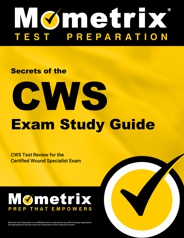The Certified Wound Specialist (CWS) exam is designed to assess your specialized knowledge of wound management. The American Board of Wound Management (ABWM) sponsors the certification, and successful completion of the exam entitles you as a Certified Wound Specialist.
Click “Start Test” above to take a free CWS practice test!
CWS Exam Eligibility
To be eligible for the exam, you must hold a current and unencumbered professional license and have at least three years of clinical wound experience. Acceptable licenses are as follows:
- DO
- DPM
- MD
- NP
- DVM
- PA
- PT
- OT
- PharmD
- RD
- RN
CWS Exam Outline
The CWS exam contains 150 multiple-choice questions, 25 of which are unscored, and you will be given a 3-hour time limit. The unscored questions are used to validate questions that may appear on future versions of the exam.
The exam is split into five content domains:
1. Wound Healing Environment (23 questions)
The questions in this domain cover the various aspects of wound healing and anatomy and physiology.
Wound healing
- Integumentary
- Neurological
- Musculoskeletal
- Vascular
- Endocrine
- Renal
- Lymphatic
- Respiratory
- Immunologic
Anatomy and physiology
- Phases
- Acute vs. chronic
- Cell functions
2. Assessment and Diagnosis (34 questions)
The questions in this domain cover the various aspects of assessing and diagnosing a patient.
- History
- Wound assessment
- Skin assessment
- Physical exam
- Pain assessment
- Functional assessment
- Risk assessment
- Laboratory/Imaging/Biopsy
- Nutrition
3. Patient Management (30 questions)
The questions in this domain cover the various aspects of the patient management process.
- Dressings
- Wound bed preparation
- Topical agents
- Tissue products for wounds
- Nutrition
- Healing complications
- Biophysical technology
- Hyperbaric oxygen therapy
- Compression therapy
- Negative pressure wound therapy
- Surgical closure or tissue transfer
- Pressure redistribution
- Ostomy
- Case review
4. Etiological Considerations (26 questions)
The questions in this domain cover the various aspects and types of etiological considerations.
- Burns
- Ischemia
- Infectious
- Edema
- Venous insufficiency
- Dermatological
- Inflammatory
- Pressure-related wounds
- Trauma
- Atypical etiologies
- Lymphedema
5. Professional Issues (12 questions)
The questions in this domain cover various legal, ethical, practical, and general issues and challenges that wound care specialists should be prepared to handle.
- Patient adherence
- Multidisciplinary teams
- Documentation/legal concepts
- Epidemiology
- Reimbursement and medical economics
- Evidence-based research and practice
- Medical ethics
Check Out Mometrix's CWS Study Guide
Get practice questions, video tutorials, and detailed study lessons
Get Your Study Guide
Registration
To register for the exam, you must fill out an online application on the ABWM website. This application will include any supporting documentation needed to prove eligibility, as well as the $575 fee.
Once your application is approved, you will receive a confirmation email that contains information on how to schedule your exam with Pearson VUE.
Test Day
On the day of your exam, you should arrive at the testing center 15-30 minutes early to allow time for the check-in process. If you arrive more than 15 minutes late, you will not be able to take the exam.
When you arrive, you will be asked to provide two valid forms of identification, one of which must be a government-issued photo ID. If any form of ID is invalid, you will not be able to take the exam.
Once you are checked in, you will be asked to leave all personal items behind in a secure locker. This includes your cell phone, bag/purse, hat, wallet, watch, book, food, and any electronic device.
The proctor will lead you to the testing area once all of the security procedures are taken care of. Before you begin, you will be given a calculator and a dry-erase board to use during the exam, and you will be given an opportunity to take a five-minute practice exam.
How the Exam is Scored
The CWS exam is scored using a criterion-reference method, meaning the passing score has been predetermined by subject-matter experts based on the difficulty of each exam question. This also means that each administration of the exam contains a slightly different pool of questions, so the number of questions you must answer correctly to pass will be different for each administration.
You will receive a score report immediately following the exam, and you can access this report via your online Pearson VUE account.
Retaking the Exam
If you do not pass the exam, you may retake it after a 30-day waiting period. You must reapply for each retake, which includes paying a $275 re-application fee each time.
Check Out Mometrix's CWS Flashcards
Get complex subjects broken down into easily understandable concepts
Get Your Flashcards
How to Study
How to Study Effectively
Your success on CWS test day depends not only on how many hours you put into preparing but also on whether you prepared the right way. It’s good to check along the way to see whether your studying is paying off. One of the most effective ways to do this is by taking CWS practice tests to evaluate your progress. Practice tests are useful because they show exactly where you need to improve. Every time you take a free CWS exam practice test, pay special attention to these three groups of questions:
- The questions you got wrong
- The ones you had to guess on, even if you guessed right
- The ones you found difficult or slow to work through
This will show you exactly what your weak areas are and where you need to devote more study time. Ask yourself why each of these questions gave you trouble. Was it because you didn’t understand the material? Was it because you didn’t remember the vocabulary? Do you need more repetitions on this type of question to build speed and confidence? Dig into those questions and figure out how you can strengthen your weak areas as you go back to review the material.
Answer Explanations
Additionally, many CWS practice tests have a section explaining the answer choices. It can be tempting to read the explanation and think that you now have a good understanding of the concept. However, an explanation likely only covers part of the question’s broader context. Even if the explanation makes sense, go back and investigate every concept related to the question until you’re positive you have a thorough understanding.
Comprehend Each Topic
As you go along, keep in mind that the CWS practice test is just that: practice. Memorizing these questions and answers will not be very helpful on the actual test because it is unlikely to have any of the same exact questions. If you only know the right answers to the sample questions, you won’t be prepared for the real thing. Study the concepts until you understand them fully, and then you’ll be able to answer any question that shows up on the test.
Strategy for CWS Practice
When you’re ready to start taking practice tests, follow this strategy:
- Remove Limitations. Take the first test with no time constraints and with your notes and CWS study guide handy. Take your time and focus on applying the strategies you’ve learned.
- Time Yourself. Take the second practice test “open book” as well, but set a timer and practice pacing yourself to finish in time.
- Simulate Test Day. Take any other practice tests as if it were test day. Set a timer and put away your study materials. Sit at a table or desk in a quiet room, imagine yourself at the testing center, and answer questions as quickly and accurately as possible.
- Keep Practicing. Keep taking practice tests on a regular basis until you run out of practice tests or it’s time for the actual test. Your mind will be ready for the schedule and stress of test day, and you’ll be able to focus on recalling the material you’ve learned.
FAQs
Q
How many questions are on the CWS exam?
A
There are 150 multiple-choice questions on the exam, 25 of which are not scored.
Q
How long is the CWS exam?
A
The time limit for the exam is 3 hours.
Q
How much does the CWS exam cost?
A
The examination fee is $575.
Mometrix Test Preparation is not affiliated with or endorsed by any official testing organization. All organizational and test names are trademarks of their respective owners.


